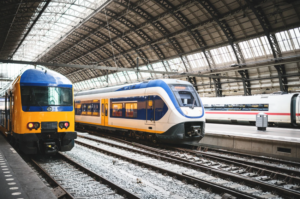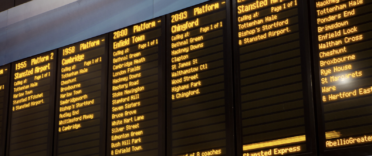 Regulated rail fares across England and Wales increased on 5th March 2023, with the government setting the cap at 5.9%. Regulated rail fares account for around 45% of all rail fares and include season tickets on most commuter journeys, some off-peak return tickets and some anytime tickets around major cities. While rail fare increases are usually linked to inflation figures from the previous July, the government has based this year's increase cap on average earnings growth, which was 5.9% in July 2022.
Regulated rail fares across England and Wales increased on 5th March 2023, with the government setting the cap at 5.9%. Regulated rail fares account for around 45% of all rail fares and include season tickets on most commuter journeys, some off-peak return tickets and some anytime tickets around major cities. While rail fare increases are usually linked to inflation figures from the previous July, the government has based this year's increase cap on average earnings growth, which was 5.9% in July 2022.
Public transport fares have also increased in Northern Ireland by 7% and the Scottish government has yet to make an announcement on any potential increases after it froze ScotRail fares until the end of March.
UK rail minister, Huw Merriman said: "I understand it has been a difficult year and people are feeling the pinch which is why, through the biggest ever government intervention, we capped the rise well below inflation and delayed it coming into force."
How much is the rail fare increase in 2023?
Regulated rail fares across England and Wales increased by up to 5.9% on 5th March 2023, impacting most season tickets and many off-peak fares across the rail network. Rail fares that are not regulated include first-class fares and some advance tickets. That is not to say that these fares will not increase, in fact, as they are not regulated, these types of fares could be hit by bigger hikes as any potential increases are not capped. Unregulated rail fares are set by individual operators and are often impacted by commercial decisions based on demand and revenue.
Example season ticket increases for 2023
| 2022 Season Ticket Price | 2023 Season Ticket Price | Increase (%) | Increase (£) |
| £1,000 | £1,059 | 5.90% | £59 |
| £1,500 | £1,589 | 5.90% | £89 |
| £2,000 | £2,118 | 5.90% | £118 |
| £2,500 | £2,648 | 5.90% | £148 |
| £3,000 | £3,177 | 5.90% | £177 |
| £3,500 | £3,707 | 5.90% | £207 |
| £4,000 | £4,236 | 5.90% | £236 |
| £4,500 | £4,766 | 5.90% | £266 |
| £5,000 | £5,295 | 5.90% | £295 |
How to save money on rail fares
The latest rail fare hikes will be another blow to households already impacted by the cost of living crisis. Rising energy bills and increased food costs have led to runaway inflation and we've seen record increases in household bills including council tax and broadband. We've provided a few tips below on how you can save money on rail fares in 2023.
Use a railcard
There are nine main railcard types that provide discounts for certain travellers or journeys. These include:
- 16-17 Saver
- 16-25 Railcard
- 26-30 Railcard
- Disabled Persons Railcard
- Family & Friends Railcard
- Network Railcard
- Senior Railcard
- Two Together Railcard
- Veterans Railcard
The railcard may cost money to purchase in the first place but savings can be made if you are a regular traveller. Figures provided by railcard.co.uk confirm that the average annual saving made by combined railcard holders between April 2021 and March 2022, is £140. This excludes the price of the railcard.
Plan ahead
Train tickets can be purchased up to 12 weeks prior to your departure date and some super advanced tickets are available to purchase up to 24 weeks in advance. Purchasing early is often the cheapest way to travel, especially if you are happy to travel at a fixed time and date in the future.
Get alerts
Avoid disappointment and guarantee the best price with an alert. Websites such as The Trainline allow you to create an alert for when advance tickets for your journey become available, helping you beat the queue and guarantee a good price.
Be flexible
If you do not need to travel to work every day, consider getting a Flexi Season ticket. A Flexi Season ticket allows you to travel on any 8 days in a 28-day period and works out at least 20% cheaper than the equivalent price purchased using a standard monthly season ticket.
Travel with others
If you are travelling in a group of 3-9 adults then you can get up to 33% off of your travel. Those travelling in groups of 10 or more can also get discounts, however, it will depend on the rail operator, so make sure that you check when travelling in large groups.
Split your journey
If you are travelling a long distance, check to see if you can split your journey as it may save you money. Split ticketing is where you split your train journey down into smaller, individual journeys, which can often work out cheaper. For example, if you were travelling from Birmingham to Norwich, it may be cheaper to purchase tickets from Birmingham to London and then London to Norwich separately.





